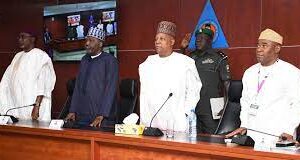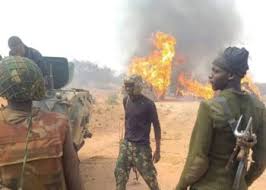NIPSS broke, says acting DG
By Abdullahi M. Gulloma
Abuja
Confronted with the stark reality of the nation’s fiscal standing after his election in 2015, President Muhammadu Buhari, yesterday confessed that he almost absconded from office.
Buhari, a retired general, made the shocking disclosure at the Presidential Parley with members of the Senior Executive Course No. 38 (2016) of the National Institute for Policy and Strategic Studies (NIPSS) at the State House, in Abuja.
According to him, the Peoples Democratic Party-led government (1999 to 2015), saved nothing for the rainy day, and also refused to develop the country’s infrastructure when crude oil was selling for $100 per barrel.
The President said it is difficult to believe that the unprecedented revenue realised while crude was being pumped at 2.1 million barrel per day, went to importation of food and refined petroleum products.
He said: “For 16 years and eight consecutive governments of the other party, and you know that there was unprecedented revenue realised, the oil projection which can be verified was 2.1 million barrels per day. From 1999-2015, the average cost of each Nigerian barrel of oil was $100 per barrel.When we came, it fell to less than $30 per barrel and is now oscillating between 40 and 50.
“Actually, I felt like absconding because 27 out of 36 states in Nigeria cannot pay salaries and we know they have no other source than to depend on salaries. And I asked any savings? I was told there was no savings, and I asked, what have you done on agriculture, power, rails, roads? Nothing!
“You know more than I do because you move around. I have not been moving around since after elections but you do, how many of the Trunk A roads are still good enough? How much power do we have? Although, there are some elements of sabotage. I was told the money was used to import food and fuel. I didn’t believe the answer and I still don’t believe it.
“Until now, substantial number of people in the East eat garri and groundnut, in the West pounded yam, cassava and vegetables, in the North, it is tuwo which is made from any of the grains, millet, sorghum. They eat it in the night and warm it in the morning and eat it and take fura da nono in the afternoon. How many of those people can afford foreign food?
“Then, they said I should check out the petroleum, the legislature dedicated 445,000 barrels per day for internal consumption and that is just 60 per cent of our requirements.
I said okay, what of the 40 per cent? The marketers that are bringing it just present documents, papers are just stamped and monies are taken away. This is the type of things that the Nigerian elite are doing to our own country. When you go back, look at your colleagues and encourage them to be truly Nigerians.”
The President also spoke on the report of the NIPSS products, saying its findings and policy recommendations were excellent.
He commended participants of the Senior Executive Course 38 for taking up his challenge to participants of the Senior Executive Course 37, six months after he came into office.
“I have looked forward to receiving this report because it touches on one of the fundamental problems confronting our nation. The report comes at a time when our economy is experiencing a downturn and all efforts are being made by the administration to get our country moving again.
“In the last one and half years of this administration, the economy has experienced some tough times, particularly with the decline in oil revenues, which has some harsh impacts on Nigerians at the grassroots. It is also important to note that the economic recession is not the making of this administration, but rather a consequence of bad management of the economy in the last decades. Not that recession is limited to Nigeria – there are far, far worse cases than Nigeria,” he said.
He said the present administration would never abandon the poor because it is committed to finding lasting solutions to the numerous economic challenges the nation is currently facing.
According to him, “whatever the scale of the problem, the important thing is how one tackles it. Accordingly, this administration is committed to finding lasting solutions to our economic structure imbalance. Let us have faith in our great nation that we will come out of this recession vibrant and strong. I am glad that the report presented today has given us reason to keep faith in our ability to overcome our challenges.
“There is no doubt that poverty, for decades, has been a main challenge to us as a nation despite the country’s enormous wealth. Several policies and programmes that had been implemented over the years, as rightly observed by the Report, have not broken the cycles of poverty in Nigeria. From the findings of the research by the participants, it is evident that strengthening our institutions is key to reducing poverty and endangering inclusive development.
“It is impossible for this administration to ignore the poor who made great sacrifice to bring us to government. Ours, more than any other government in the history of Nigeria, is a people’s government. We therefore must and we will keep faith with the people. It is in this light that I wish to declare the commitment of this administration to the Sustainable Development Goals, most especially, to ending extreme poverty in Nigeria.
“It is not going to be easy, but we are committed to dealing with the challenges in a decisive manner. Fortunately, the report had prescribed some concrete measures on how to reduce poverty in the country.”
In his remarks, the Acting Director General of NIPSS, Mr. Jonathan Juma, said a lot can be done by the institute if more robust budgetary support is extended to it.
He said for NIPSS to operate as an apex institution and be at the forefront of relevant researches for national development, it must recruit and retain top level academics, very senior technocrats and other experienced specialised experts.
“At the moment, I must confess to you that the national institute is operating below its conceived capacity due to its inability to attract a full complement of requisite staff who would conduct research across broad strategic areas of national life, and also impact new knowledge.
“The financial situation of the national institute is precarious. The payments for utility services are in arrears and worse still, we have to live with threats of litigation from numerous creditors. Operational vehicles in the institute’s fleet have aged and are a source of constant embarrassment,” he said.



